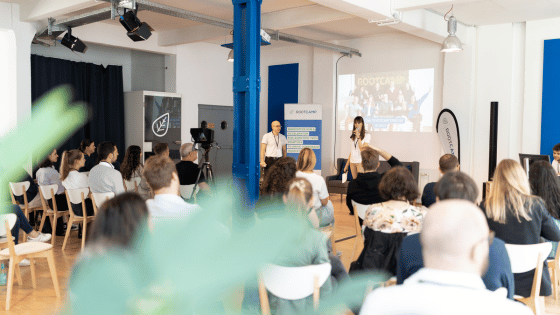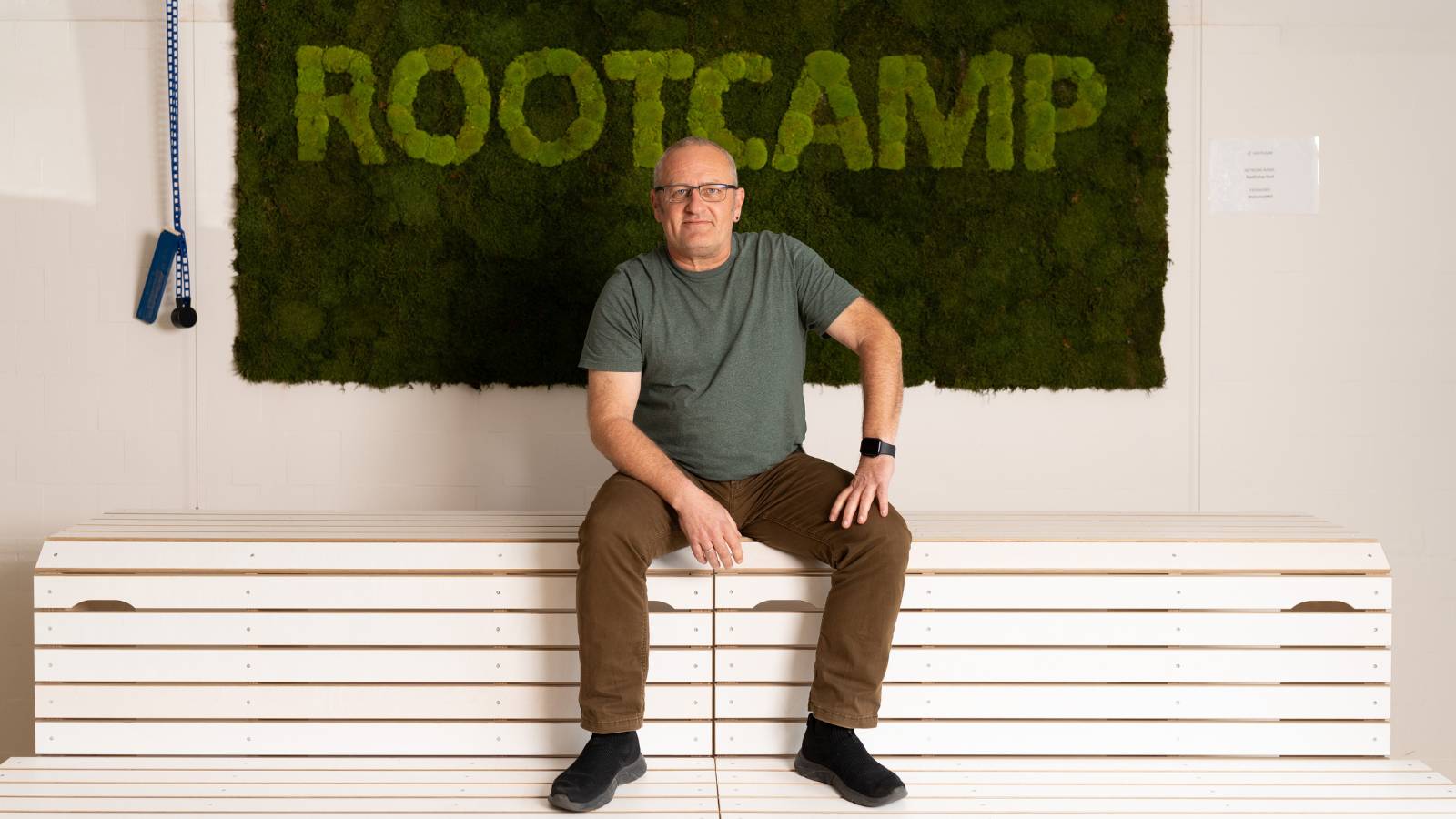Verdancy is a spin-off from the Schwaneberg Group at RWTH Aachen University and DWI – Leibniz Institute for Interactive Materials. The startup from RootCamp Batch#5 is committed to enhance plant protection in response to our dynamic biodiversity loss. Central to their mission is the advancement of environmentally friendly and highly efficient methods to promote plant health. We spoke with founder Nikola Mijailovic about how Verdancy is reshaping pesticide delivery, ensuring effective crop protection while addressing environmental challenges in agriculture.
6 min read
Verdancy is bringing the new gold standard in pesticide delivery
By Linh Pham on Apr 11, 2024 1:05:25 PM
Topics: Startup Bios startups Interview
4 min read
Regen Insight - Environmental analytics for regenerative agriculture
By Linh Pham on Apr 10, 2024 2:02:41 PM
Agriculture is one of the world's largest producers of greenhouse gas emissions. However, the widespread adoption of climate-friendly practices could transform agricultural soils into one of the largest carbon sinks in the world, effectively removing carbon from the atmosphere. In response to this urgent need for climate action, Regen Insight from RootCamp Batch #5 aims to help farmers make the transition to regenerative agriculture. The developed MRV (Monitoring, Reporting and Verification) platform helps farmers understand their carbon footprint and develop actionable plans funded by carbon credits linked to their environmental impact. Using advanced technologies, including satellite and soil data, Regen Insight accurately measures emissions reduction and carbon storage on farms, ensuring the credibility of sustainable actions. Learn how Regen Insight empowers farmers to transition to regenerative practices and discover their future plans in our interview with CEO and founder Etienne Variot.
Why did you decide to start a startup, and how did the idea for Regen Insight come about?
After 5 years working in finance, I wanted to use my skills for a cause that mattered to me: protecting our environment and restoring our natural ecosystems. Launching a start-up was clearly the most action-oriented approach and offered interesting challenges. Following eight months of discussions with experts, deep dives into climate change, biodiversity, and natural capital, and exploration of various solutions, my co-founder Samuel and I came to understand that farmers would play a key role in meeting our collective environmental ambitions. We realized that farmers did not have any simple solution to understand and track their carbon footprint, and they faced a financing gap to transition to regenerative agriculture.
Can you explain the process of how your MRV platform works and how it benefits farmers?
The Regen Insight platform is designed for any farming organization to onboard and assist farmers in transitioning to carbon farming through a white-label solution. We strengthen and support their relationship. Within the platform, farmers can calculate their carbon footprint, devise action plans, and track their progress. Our partners can engage with farmers at every stage, offering guidance on pertinent farming practices. Additionally, once the transition project is underway, partners can generate and trade carbon credits to reward farmers for their carbon performance.
What makes your solutions stand out from the existing ones on the market?
We have two major strengths. Firstly, we've invested over two years exclusively in refining the user experience, resulting in a seamless process where farmers independently create their action plans in under an hour. This breakthrough enables partners to rapidly scale operations and significantly reduce technical support costs on farms. Partners can focus primarily on advising farmers rather than data collection. Our pilot project in France showcased remarkable results, with one partner effortlessly engaging 60 farms in just three months.
Secondly, we boast one of the largest scientific teams in the field. As the first Tier 3 MRV (the highest ranking) in Europe and pioneers in utilizing satellite imagery to automatically verify regenerative practices implementation, we quickly aligned with leading carbon accounting standards such as ISO 14-064 and the GHG Protocol. This creates trust in the carbon credits we generate.
Could you share some success stories or case studies of farms that have benefited from Regen Insight's services?
Our pilot project in France showcased remarkable results, with one partner effortlessly engaging 60 farms in just three months. They achieved this with very limited costs, as only two part-time technicians offered farms this new service, seizing the opportunity to strengthen their relationship with farmers. To illustrate this success story with clear figures, their carbon program covers nearly 25,000 hectares and allows for the generation of 30,000 carbon credits per year. In terms of value, this new commodity represents over €1 million per year that will be paid to their farms.
The RootCamp Accelerator program is almost over. How has the program been helpful to you?
RootCamp has been a valuable partner over the past few months as we've initiated our expansion across Europe. Not only is RootCamp a gateway to Germany, providing numerous introductions to local players, but it has also offered highly relevant advice, particularly in refining and communicating our value proposition. Despite being a team of seasoned entrepreneurs, with almost 5 years into the project now, the level of expertise from participating experts enabled us to keep improving.
What's coming up next?
We started our European expansion with rooted operations in France and Eastern Europe. We are pleased to support new partners eager to begin producing and benefiting from this new carbon commodity. Additionally, we are closely monitoring the evolution of the CRCF (the European framework for carbon credits in agriculture), with the intention of deploying it across Europe as soon as it comes into force. We are thrilled to witness our vision coming to life as more and more farmers confidently engage in regenerative agriculture.
Benefit from the RootCamp Accelerator program like the startup Regen Insight. Startups from the Agtech and Bioeconomy sectors can apply for the new batch until May 30th.
Topics: Startup Bios Interview
3 min read
Startup Seedrise accelerates the global shift to regenerative agriculture
By Linh Pham on Apr 5, 2024 2:57:35 PM
The Berlin-based startup Seedrise, led by a team of researchers, is incorporating biochar into new sustainable farming products through a revolutionary formula. Their innovative approach aims to develop solutions for farmers facing challenges such as dry soils and water scarcity. This not only accelerates the global transition to regenerative agriculture but also contributes to climate protection. We talked with the founder, Johannes Musiol, to delve into the origins of Farmula's mission and explore the potential impact of their approach on sustainable agriculture.
Explain how Seedrise's seed-coating solution works, and what sets it apart from traditional methods?
Typically, farmers drill seeds into the ground, apply fertilizer several times, and spray chemicals for plant protection. However, this way of farming comes with three downsides: Firstly, plants only receive macronutrients such as NPK and do not enjoy valuable growth enhancers such as biostimulants, mycorrhiza, and other microorganisms. Secondly, much of the fertilizer applied is lost due to leaching and evaporation, which is not only a huge economic loss but also a massive climate burden. Lastly, current plant protection products greatly harm our soils, making them less fertile.
Our seed coating tackles all those problems at the same time. While normal seed coatings have very thin layers and do not offer a lot of space for agricultural inputs, our coating, which is based on biochar, offers tremendous space for everything the plant needs. As a result, we are able to apply all necessary nutrients as well as other growth enhancers directly to the seed. Everything applied is used by the plant and cannot leach or get lost in any other way. This way, we are able to increase yields and reduce costs while cutting CO2 emissions at the same time.
What impact doesyour technology have on reducing CO2 emissions in agriculture?
Our impact on climate stems from two primary sources. Through the application of biochar and microorganisms to the soil, we bolster natural carbon sequestration, fostering healthier soil and promoting humus buildup. Additionally, our coating ensures fertilizer remains intact, minimizing wash-off and loss. This approach anticipates a reduction of mineral fertilizer application by over 50%, translating to roughly 1 ton/ha for corn. Consequently, this not only saves costs and enhances soil health, but also significantly reduces CO2 emissions.
What advantages does your seed coating have for farmers?
They'll enjoy higher yields thanks to growth enhancers such as biostimulants, microorganisms, and mycorrhiza, as well as from healthier soils in the long run, which contain more humus and provide better protection against high temperatures. Additionally, they can streamline operational processes, reducing costs associated with fuel, personnel, and machinery. Lastly, we anticipate eligibility for CO2 certificates due to reduced mineral fertilizer usage and more sustainable farming practices.
Currently, our product is not yet available for sale. However, farmers should expect to be able to purchase our products in 2025, initially focusing on corn and rapeseed, either directly through us or via our partners.
How did you come up with the idea for your product?
We have been working with biochar for many years and have always been amazed by its ability to improve soils and increase yields. Biochar is particularly relevant due to its capacity to enhance soil health, sequester carbon, and promote sustainable agriculture practices. After developing several fertilizer-related products, creating a seed coating utilizing biochar seemed like the logical next step.
How has RootCamp supported your startup along the way?
RootCamp has been an amazing experience, and we have particularly benefited from the vast network and expertise of its mentors. As a startup, you cannot receive enough feedback to focus on the things that are truly important.
Update 2024:
Seedrise has successfully closed its pre-seed funding round, with significant investment from several business angels including Ingo Schütte.
➡️ Do you want to level up your startup like Seedrise and benefit from the unique ecosystem of innovation hub RootCamp? Sign up for our newsletter and follow us on LinkedIn to not miss the next application deadline.
Topics: Startup Bios Interview
5 min read
Proofminder - leaf-level farming platform
By Linh Pham on Feb 29, 2024 10:24:41 AM
Meet Proofminder, a Budapest-based startup founded in 2023 by Norbert Havas and Ambrus Vancso and Simon Levente currently part ofRootCamp Batch #5. Proofminder's technology integrates advanced AI with drone-acquired visual data, providing precise insights at the leaf level across extensive agricultural areas. It enables meticulous plant monitoring, accurately identifies stress factors, diseases, and weeds, while also supporting various agricultural needs such as stand counting, weather damage analysis, and nitrogen assessment. Delve in this interview into their innovative approach to tackling agricultural challenges through AI-powered precision solutions.
How does your AI-powered platform actively address the challenges in agriculture that you aim to overcome?
According to the EU’s Farm to Fork strategy, the amount of chemical pesticides and more hazardous pesticides should be reduced by 50% by 2030, while at least 25% of agricultural land in the EU should be under organic farming. Today’s intensive agriculture requires proactive and constant usage of chemicals to protect the yield and quality from different pests. The FAO estimates that annually between 20-40% of global crop production is lost to pests.
For this reason, various kinds of pesticides, herbicides, insecticides, fungicides, etc. are constantly used during the growing season on fields and in horticulture. Pesticide usage was between 350,000-400,000 tons per year between 2011 and 2019. The amount did not decrease substantially despite the communicated directives of the European Union. One reason for this could be that in the case of traditional, non-differentiated spraying, chemicals are not sprayed where their effect is required on the plants, mainly due to technological constraints and because the infected area is unknown. This can result in a huge waste of chemicals, further increasing their negative impact on the environment.
How does Proofminder differentiate itself from existing precision agriculture solutions?
Mainstream precision agriculture concentrates on fields and zoning, mainly based on satellite imagery or digital scouting, and cannot address many agricultural challenges. Proofminder brings precision agriculture to the next level by enabling growers to shift their focus from plots to individual plants. The platform extracts insights from visual data, mostly drone images, using AI to provide growers with valuable information and actionable reports about every square centimeter of their fields throughout the season. The number of use cases is almost unlimited, and thanks to a complete infrastructure, new use cases (or AI models) can be trained in a few days and scaled to as many hectares as needed. With an end-to-end approach, growers can innovate production processes without specialized knowledge. Our proven use cases show increased ROI (2-5x), improved food quality, and resource savings up to 80%, including reduced inputs, chemicals, labor costs, and CO2 emissions.
Moreover, our reporting flexibility integrates seamlessly with leading industry solutions. For example, hyper-precise spot spraying maps can be easily uploaded to equipment like John Deere sprayers or DJI spraying drones for efficient implementation.
Can you share specific use cases illustrating the environmental benefits of integrating AI, especially in missed tassel detection and intelligent weed mapping in agriculture?
Examples include geo-referenced plant population analysis, hyper-precise weed detection, and spot spraying maps, wildlife or weather damage analysis, yield assessment or loss, among others. Once a grower identifies the use case, we cover the entire journey – from image gathering to providing time-sensitive and hyper-precise reports in various formats.
Use case of missed tassel detection for corn seed production. Photo: Proofminder
We collaborate extensively with crop producers, orchards, tree farms, and seed production companies. Our most popular high-ROI use cases involve missed tassel detection in hybrid corn to enhance seed quality and weed detection maps that can be exported to any spraying machine or drone, allowing for intelligent field spraying and saving up to 80% on chemicals and budget.
In 2023, we processed over 1000 hectares in the system and executed projects on three continents, spanning various countries in Europe, South Africa, and India. In December 2023, we expanded our presence by hiring representatives in Brazil and Australia to explore new markets and are currently seeking pilot projects in these locations. Our customer base includes top seed companies and large farms, with some names undisclosed due to NDA agreements. However, we showcase the logos and case studies of the rest on our website.
Provide insights on the future of AI in agriculture, and how do you plan to stay at the forefront?
We do see the awareness and adoption of technologies on farms of all sizes, which is great. A few years ago, having a drone on the farm or utilizing AI in the production process sounded like rocket science, and now growers who implemented precision AgTech solutions see great outcomes and are willing to scale. Every day, we speak with growers and drone service providers, hearing ideas for new use cases. We are open to joint innovations and dedicate slots for this each month. Recently, we launched new UI and self-service features in the platform. These new features will make it easier to start and use our platform, both for growers and drone service providers.
What do you want to achieve during the RootCamp acceleration program?
Reviewing our strategy, positioning, and company evaluation is a very good opportunity for us now. The key success indicators of our participation would be new industry connections, increased awareness, and piloting or joint innovation with a farm or seed production company. Also, we are currently raising the next round and are open to new connections with investors.
For a closer look at Proofminder's platform, we invite you to join us during our upcoming Demo Day on April 10th at the RootCamp Headquarters. Here, you can meet the founders and explore the features and benefits in detail. Get a ticket Demo Day ticket here.
Topics: Startup Bios Interview
4 min read
NoMaze - Simplifying plant breeding analytics with AI
By Linh Pham on Feb 1, 2024 7:00:00 AM
NoMaze was founded straight out of university by Finn Gaida and Jean-Pascal Lutze. The Munich-based startup accelerates plant breeding research using AI. The vision at NoMaze is grounded in the belief that data should provide answers, not questions. In this interview, we explore how NoMaze, a participant in RootCamp Batch #5, tackles the challenges of plant breeding data analytics under time constraints. Learn about their innovative software solution designed to streamline the plant selection process and discover how they contribute to sustainable agriculture.
How does NoMaze's solution empower researchers and breeders?
NoMaze enables plant breeders and researchers to optimize yield and make informed decisions through a suite of specialized tools. We have developed multiple field trial analysis use cases, such as head-to-head comparisons and General Combining Ability /Specific Combining Ability analyses. These are available as user-friendly, drag-and-drop blocks in our software, simplifying complex analyses. For more advanced needs, our marker-based genomic selection tool helps model Genotype-by-Environment interactions. This feature is crucial for uncovering patterns and insights that might be hidden or challenging to find without NoMaze. It enables a deeper understanding of how genetic factors interact with environmental conditions, leading to more precise breeding decisions.
Looking to the future, we are working on predicting phenotypic values, such as yield or plant lodging, based on genetic sequences and environmental data, such as temperature. This predictive capability will be a significant milestone, allowing breeders to anticipate plant performance under various conditions, further aiding in yield optimization and informed decision-making.
What specific challenges in data analysis do researchers and breeders face?
In plant breeding, researchers and breeders often grapple with highly complex data derived from multiple sources. Addressing this challenge, our platform provides easy and intuitive tools for data visualization and handling, simplifying the complexity and allowing users to seamlessly integrate and interpret diverse data sets. Another significant challenge is the seasonal high time pressure in plant breeding. To alleviate this, the platform incorporates automation in key areas, speeding up processes and reducing manual workload. Recognizing the inefficiencies and frustrations caused by frequent back-and-forth communication between different departments, our solution offers a common communication layer and shared documents within the platform. This facilitates smoother collaboration, ensuring that all team members are on the same page and can access the information they need without delays.
Can you elaborate on the broader impact that NoMaze has on addressing key challenges in agriculture, particularly in the context of improving plant breeding processes?
NoMaze provides enhanced insights that lead to significant improvements in crop breeding. Our startup contributes to the development of crops with higher yields and reduced risk of harvest loss. This not only helps in lowering food prices but also contributes to greater stability in food supply chains. Our impact extends even further, aligning with the United Nations Sustainable Development Goals (SDGs), particularly SDG 2 (Zero Hunger) and SDG 13 (Climate Action). By improving crop yields and breeding processes, NoMaze aids in addressing global hunger challenges and supports sustainable agricultural practices that are crucial for reducing emissions and capturing carbon. Additionally, as part of the Breedfides project by the Federal Ministry of Education and Research, we are working to democratize genomic prediction. This initiative aims to make advanced genomic tools accessible to a broader range of researchers and breeders, especially in underrepresented and developing regions. By doing so, we're not only enhancing global food security but also promoting equity in the agricultural sector.
Could you share insights into the future roadmap for your startup, outlining any upcoming features or improvements?
Our upcoming roadmap includes a major design rework to enhance the user experience, making our data understanding tools more intuitive and accessible. Additionally, we're integrating machine learning predictions with our data visualizations, offering plant breeders more insights and predictive analytics alongside their genomic and phenotypic data. This integration will facilitate more informed decision-making. Moreover, we're continually expanding our use case library to address a wider range of plant breeding challenges and objectives, ensuring our platform remains versatile and highly relevant to our users' needs. These developments aim to empower plant breeders with advanced, easy-to-use tools for their research and practices.
Why did you apply for the RootCamp accelerator program?
We decided to join the RootCamp accelerator for a few key reasons. Firstly, it opens doors to an awesome network of partners in the agriculture sector. This is a big deal for us because it means more chances to collaborate and expand our reach. Secondly, having access to the investor and mentor network at RootCamp, along with their expertise and guidance, helps us. They understand what we're trying to do and can offer targeted advice to support us move forward. Lastly, the program is a great opportunity to meet other founders who are on a similar journey. It's both reassuring and holds us accountable to our goals, all while having a good time together.
If you're eager to meet Finn and Jean in person, be sure to save the date: February 7th for Batch#5's Partners & Mentors Day and RootCamp Ecosystem Party in Hannover. Don't miss out—secure your spot by registering here!
Topics: Startup Bios Interview
4 min read
Amata Green - Transforming agricultural waste into valuable soil enhancers
By Linh Pham on Jan 25, 2024 8:00:00 AM
Spain holds the top position globally in olive oil production, yet a considerable portion of the olive often goes underutilized in the oil extraction process. This leftover material is commonly considered as "waste," posing a notable challenge for olive oil mills. Amata Green, a startup from RootCamp Batch #5, has developed a specialized procedure to convert this intricate waste material into high-quality biochar. In this interview, we delve into how Amata Green endeavors to introduce biochar to Spain, exploring the distinctive features that make their biochar valuable and understanding its substantial impact on farming practices.
The Amata Green founders Mihaela Strungariu and Sandi Martin during the Welcome Week at RootCamp. © Amata Green
What agricultural challenges does your solution address, and why do you focus on Spain?
In southern Spain, the climate is arid and desert-like. Each year, the region experiences escalating heatwaves and droughts, resulting in dropped blooms, diminished yields, and reduced revenues for olive farmers. This challenge intensifies annually with the worsening impacts of climate change. Despite Spain's global leadership in olive oil production, only approximately 22% of the olive is utilized in the oil extraction process. The remaining portion is deemed waste, presenting a dual challenge for olive oil mills. Disposing of this waste is burdensome for the mills and environmentally unfriendly. Olive mill waste, is characterized by its extremely high moisture and oil content, posing significant difficulties in handling.
What is Eco-Mix, and what sets it apart from other products on the market?
We are currently launching “Eco-Mix” which is an agricultural soil amendment partly containing biochar made from olive mill waste. What sets our Eco-Mix apart from other similar products is its use of high-quality biochar and other sustainably sourced ingredients, all of which are natural, organic, and eco-friendly. Importantly, our product is suitable for use in organic farming. None of our ingredients are synthetic or mined. Our biochar, derived from olive mill waste, boasts exceptional richness in potassium and other beneficial elements, establishing it as a remarkable soil enhancer. Biochar plays a crucial role in enhancing water retention, promoting natural microbial activity, reducing erosion, and ensuring nutrient stability. These attributes collectively contribute to the cultivation of more drought-resistant plants and trees, fostering healthier soils and enhancing overall yields. Taking this high-quality biochar a step further, we blend it with sustainably sourced, ecologically friendly ingredients to craft a distinctive Eco-Mix soil amendment.
This year, the startup aims to make up to 50 tons of biochar available for pre-sale. © Amata Green
Describe the environmental benefits and impacts of using biochar.
The impacts and benefits of using biochar in agriculture are numerous. In addition to providing relief to farmers dealing with depleted soil, erosion problems, and coping with drought conditions, Spain suffers from toxic algal blooms in drinking water reservoirs and coastal aquaculture. As seen in the Gulf of Mexico's "Dead Zone," where nitrogen and phosphorus are washed into the Mississippi River from US farmland runoff, farming inputs do not stay confined to the land where they have been applied. This runoff triggers algal blooms that choke off the oxygen supply in the water, making it impossible for marine life to survive.
We believe that if every farm in the middle of the US were to add biochar to their soil, these agricultural inputs, including topsoil, would stay in place and not leach into freshwater systems—thus, restoring the Gulf of Mexico dead zone. In fact, our belief in biochar is so strong that, though it may sound audacious, we contend that, in theory, if every farming operation worldwide were to transition to organic/regenerative growing practices, we would not only halt climate change but also reverse it!
How do you intend to assist the European government in attaining its sustainability objectives?
Under the Green Deal's Farm to Fork strategy, the European Commission has set a target of at least 25% of the EU's agricultural land to be organic farming by 2030. To meet this objective, farmers need alternatives to chemical inputs, and Amata Green's Eco-Mix is the ideal solution. Furthermore, the European Union has set objectives to achieve climate neutrality by 2050 and has established a new target for 2030, aiming to reduce net greenhouse gas emissions by at least 55%. Each ton of our olive mill waste biochar will reduce atmospheric carbon by approximately 3 tons. This reduction will be substantial once we scale up our own biochar production facilities.
What are your goals for the next months during the RootCamp accelerator program?
We are ramping up the production of our Eco-Mix and make it available in larger quantities to farmers in Spain, Portugal, and neighboring countries. Currently, we are welcoming angel investors to join in and be a part of this product launch. Additionally, we are seeking investors or minority partners to assist us financially in next year's launch of our pilot biochar production facility. Our Eco-Mix is currently available to local Spanish farmers in small quantities and will be accessible to neighboring countries in large quantities in the next few months.
If you're eager to meet the founders in person, be sure to save the date: February 7th for Batch#5's Partners & Mentors Day and RootCamp Ecosystem Party in Hannover. Don't miss out—secure your spot by registering here!
Topics: Startup Bios Interview
5 min read
Unlocking the potential of pineapple waste: Meet circular economy startup eco:fibr
By Linh Pham on Dec 8, 2023 3:56:10 PM
Our acceleration program goes into the next round. Get to know our first startup of RootCamp batch #5. Explore the innovative strides of eco:fibr in our interview, where we discuss their pioneering approach to repurposing pineapple waste into eco-friendly pulp. The startup from Hannover was founded in 2022 by Merit Ulmer, Julian Kolbeck and Michelle Spitzer. Up to the time the startup was founded, they worked on all developments in the technical process and the business model while studying on a voluntary basis. Explore their impact, circular economy contributions, scaling goals, and commitment to foster diversity in the startup scene.
Your motto revolves around "turning waste into purpose" by producing pulp from pineapple waste. How does this innovative technology work?
At eco:fibr, we've pioneered a sustainable solution and circular processto address the environmental challenges posed by pineapple cultivation. In Costa Rica, we repurpose pineapple plant residues, effectively tackling the disposal issue and producing eco-friendly pulp. Through ongoing research, we've optimized our extraction process, prioritizing sustainability. We've developed a process that avoids harmful chemicals and solvents altogether.
This is how the pulp from pineapple waste from eco:fibr looks like. Photo: eco:fibr
In what ways does eco:fibr contribute to the circular economy?
We utilize previously unused waste material, specifically pineapple plants, from which we extract the pulp. This extends the value chain of the pineapple plant. We sell the pulp to customers in the paper industry, thereby conserving resources like wood. This practice ensures trees can be used for long-lasting products or, ideally, not cut down at all.
The team utilizes a byproduct from pineapple cultivation, which is usually burned nowadays in Costa Rica’s agricultural fields. Photo: eco:fibr
What impact has eco:fibr had on the local communities in Costa Rica in terms of economic sustainability?
This is a very exciting question that we are also currently addressing. Collaborating with our partner plantations, we're in discussions about the chemicals traditionally used for drying and how our process can conserve them. We aim to assess the positive impact on nature and the well-being of local communities. Moreover, by preventing the burning of plants in fields, we can prolong the storage of CO2, resulting in substantial environmental benefits. We anticipate a significant positive impact on the environment.
Can you share some insights into the environmental benefits of using pineapple plant waste compared to traditional wood pulp in paper production?
Our extraction process offers considerably greater resource efficiency for the environment compared to the conventional craft process used for wood pulp. This is due to several reasons: lower operating temperatures and the absence of chemicals containing sulfur or chlorine. Furthermore, our raw material doesn't require cultivation. Unlike wood, which is often grown in monocultures, our approach avoids the negative impact on biodiversity.
You are not an unknown startup in Hannover. How does eco:fibr benefit from Lower Saxony's startup ecosystem?
We've greatly benefited from the startup ecosystem in Lower Saxony. Alongside the awards and grants we've received, we're frequently invited to events and have the opportunity to share our perspective as speakers. This ongoing engagement allows us to continually expand our community and find the support we require.
As someone deeply engaged in initiatives like organizing the “Stammtisch for Female Founders in Hanover” and participating in CreateF - The Female Founders Show, what measures do you think are essential to enhance (gender) diversity within the startup scene?
Visualizing role models and organizing networking events are two methods used to encourage more women to start their own businesses. However, a central issue is the significant disparity in capital allocation between women and men. Female founders face more critical scrutiny regarding their investments compared to male founders. Additionally, far fewer women are involved as business angels.
Why did you apply for the RootCamp acceleration program?
Impressed by the quality and diversity of startups in your program, coupled with excellent feedback, we recognize challenges where RootCamp and its network could serve as a robust partner. Specifically, we seek support in developing efficient harvesting technology for optimizing pineapple operations in Costa Rica. Additionally, exploring potential use cases for our waste streams, such as creating fertilizers, pesticides, oils, and proteins—remains a priority for reintegrating them into the cycle.
You recently announced that the EU is supporting you with a grant of €800,000. Congratulations! How does eco:fibr plan to utilize this funding?
Having completed our laboratory phase and received positive feedback from potential customers during initial tests, we are now gearing up to scale our process into a pilot plant on an industrial scale. The European Fund is enabling us to accomplish this crucial phase. With these resources, we aim to scale our process and make necessary preparations to commence construction of the first production plant in Costa Rica by 2025.
RootCamp is delighted to support eco:fibr's mission and invites all AgTech and Bioeconomy startups withto apply for the next batch of the RootCamp acceleration program. Don't miss this opportunity to join a network of experts, investors, and corporate partners while accelerating your impact. Applications are open until April 23rd. Additionally, mark your calendars for our Demo Day on April 10th, where you'll have the opportunity to meet the founders.
Topics: Startup Bios Interview
4 min read
Driving change in agriculture: RootCamp launches Batch #5
By Linh Pham on Dec 4, 2023 8:00:00 AM
Introducing the latest cohort at the Innovation Hub RootCamp: a group of seven dynamic international AgTech startups. RootCamp provides invaluable support, including expert guidance, personalized coaching, and an extensive network inclusive of global AgTech companies such as K+S and KWS, as well as access to investors and mentors. Our program is cost- and equity-free for startups, offering them grants. Meet our new batch, carefully selected after a rigorous selection process from over 300+ applications. ⬇️
Topics: Startup Bios agtech RootCamp
7 min read
RootCamp Demo Day showcases innovation and talent of batch #4
By Gaia Amatteis on Sep 15, 2023 9:35:31 AM
After 12 weeks of dedicated effort, the long-awaited moment arrived. We proudly hosted the 4th Demo Day in our headquarters. This year's Demo Day for Batch 4 brought together various stakeholders. Gathering a diverse audience that spanned from local startups and investors to corporate representatives, the event placed a spotlight on the values of innovation, collaboration, and the potential for cross-industry synergy. This event was organized in collaboration with esteemed partners like K+S, KWS, hannoverimpuls, GAFS, DLG, NBank, and Startup Niedersachsen.
Topics: Startup Bios Interview
4 min read
Startup seedalive transforming AgTech with 4-hour seed germination prediction
By Linh Pham on Aug 24, 2023 4:26:30 PM
seedalive, a pioneering agTech startup from RootCamp Batch #4, has harnessed the power of technology and biology to revolutionize seed quality testing. Based in Osnabrück, Germany, the startup has developed a new, efficient, and reproducible method to predict the germination of plant seeds. seedalive founder Jens Varnskühler shares insights about the product and vision in this interview.
/rootcamp_logo_white_2022.png?width=2123&height=630&name=rootcamp_logo_white_2022.png)

/RC%20logo%202022.png?width=2325&height=703&name=RC%20logo%202022.png)

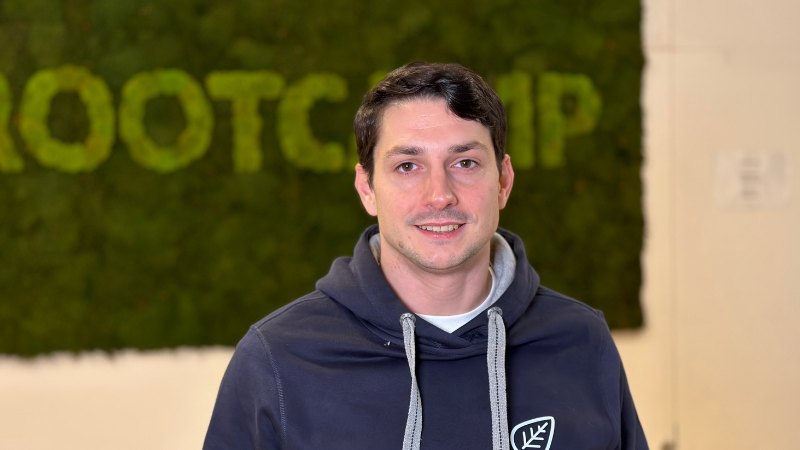
.jpg)
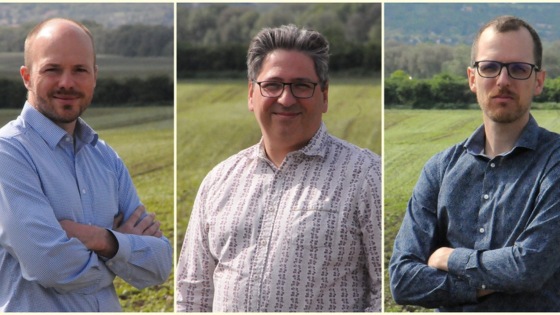
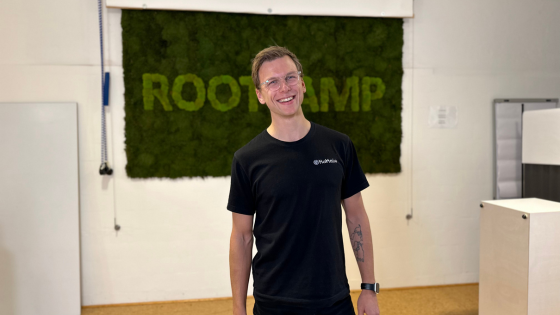
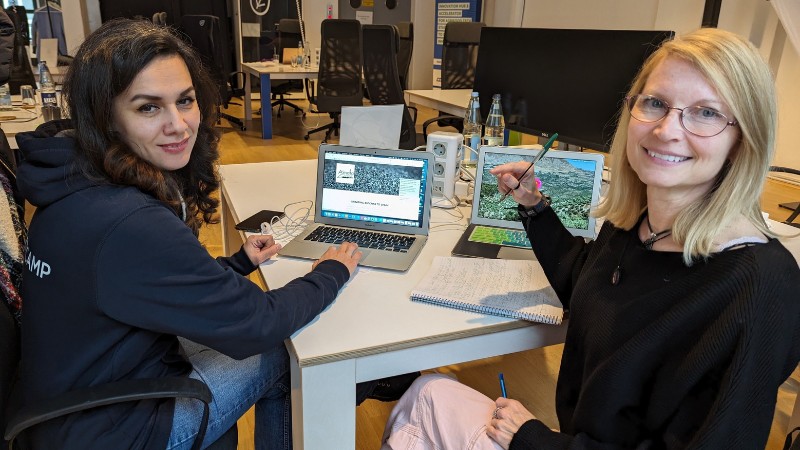
.jpg)
.jpg)
